How does one go about counting the number of spiritual people in the United States? And how do Americans define spirituality? In preparation for this survey, we reviewed the academic literature on spirituality and consulted with scholars who have published on the topic. It quickly became clear that there is no single, widely accepted definition of spirituality.
Some experts view spirituality as a broad realm and see organized religions as a small part of it.3 Others view religion and spirituality as overlapping circles, often with religious traditions being the bigger circle in American life.4 Some define spirituality as beliefs or experiences connected with the supernatural: “something beyond” humans or beyond the material world. Others think spirituality also can be about looking inward into the depths of the self, or about feeling connected with other humans, other creatures or nature.
One common perception is that the label of “religious” has been tarnished by scandals, while the label of “spiritual” carries mostly positive associations. As a result, it’s possible that declining numbers of Americans may describe themselves as religious and rising numbers may call themselves spiritual, even if their underlying beliefs and practices haven’t really changed. This means it is important to measure the way people label themselves separately from what they believe, what they have experienced, and how they practice whatever they consider to be religion and/or spirituality.
For all these reasons, we did not begin this research project with preconceived definitions of spirituality or religion. Rather, we took a practical or functional approach, posing a series of questions to a nationally representative sample of U.S. adults:
- Do you think of yourself as spiritual? (Yes or No)
- Do you think of yourself as religious? (Yes or No)
- How important is spirituality in your life? (Very, Somewhat, Not too, or Not at all important)
- How important is religion in your life? (Very, Somewhat, Not too, or Not at all important)
We also posed a follow-up question to those who think of themselves as spiritual or who say spirituality is very important to them, presenting a list of 10 possible aspects of spirituality and asking them to say which ones are essential to them.
And, we asked all the survey respondents, no matter how they labeled themselves, to tell us in their own words what “spiritual” means to them.
This chapter details how our sample of more than 11,000 U.S. adults answered that set of questions and how we categorized them, depending on their answers, into four groups:
- Religious and spiritual (48% of U.S. adults)
- Spiritual but not religious (22%)
- Religious but not spiritual (10%)
- Neither spiritual nor religious (21%)
Other chapters look, separately, at how the respondents answer many other questions about their beliefs, practices and experiences.
This approach allows us to compare the beliefs, practices and experiences of people in each of our four categories and, especially, to look for the distinguishing characteristics of Americans who are in the spiritual but not religious (SBNR) category, which is summarized briefly in the Overview of this report and detailed in the final chapter.
Who says they are spiritual or religious?
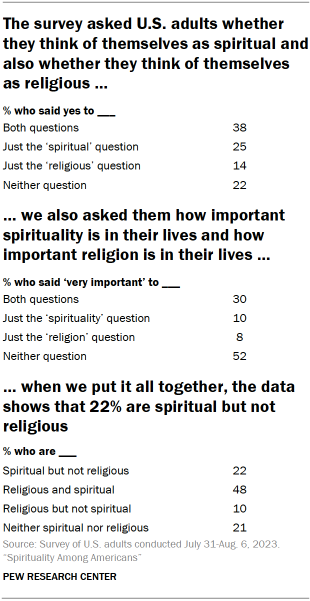
The survey asked whether Americans think of themselves as spiritual and, separately, whether they think of themselves as religious. Among Americans overall:
- 64% think of themselves as spiritual, and 53% think of themselves as religious.
- 38% think of themselves as both religious and spiritual.
- 25% think of themselves as spiritual but not religious, and 14% consider themselves religious but not spiritual.
U.S. adults were also asked how important spirituality is in their lives and, separately, how important religion is in their lives.
- 40% say spirituality is very important in their lives, and 38% say that religion is very important.
- 30% of Americans say that both spirituality and religion are very important in their lives.
- 10% say spirituality is very important in their lives but religion is not, and 8% say religion is very important but spirituality is not.
Putting these all together, 70% of Americans think of themselves as spiritual or say that spirituality is very important in their lives. And 58% think of themselves as religious or say that religion is very important in their lives. In total:
- 22% of Americans are spiritual but not religious (SBNR).
- 48% are religious and spiritual.
- 10% are religious but not spiritual.
- 21% are neither spiritual nor religious.
How religious affiliation fits into this picture
Most Americans who are affiliated with a religion are both religious and spiritual (64%). This includes 79% each of evangelical Protestants and members of the historically Black Protestant tradition, as well as 56% each of mainline Protestants and Catholics.
Of the U.S. religious groups that are large enough to be analyzed separately in this report, Jews are the most likely to be spiritual but not religious (29%) and the least likely to be both religious and spiritual (27%).5
The survey included respondents of many other religious backgrounds, including members of the Church of Jesus Christ of Latter-day Saints (widely known as Mormons), Muslims, Hindus and Buddhists. But there are not enough respondents from these smaller groups to report on their answers separately.
About half of religiously unaffiliated adults – those who answer a question about their religion by saying they are atheist, agnostic or “nothing in particular” – are neither spiritual nor religious (48%), including 80% of atheists and 58% of agnostics.
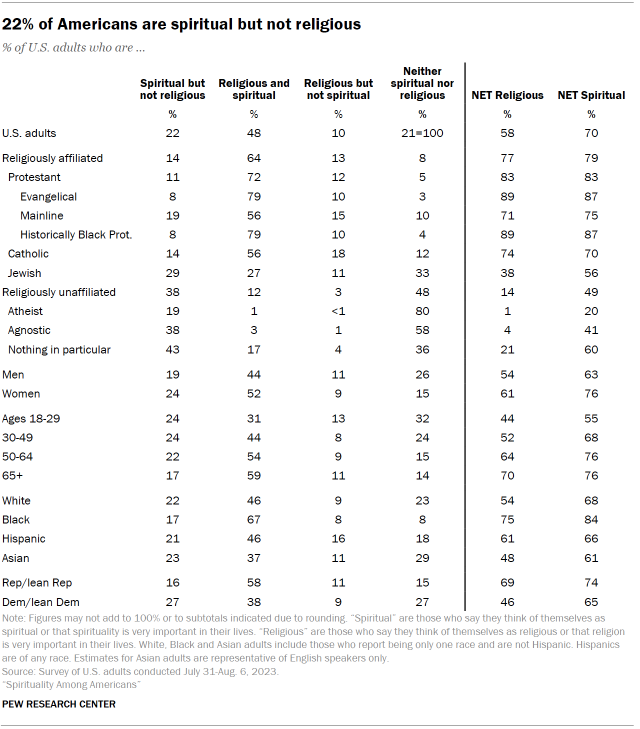
Essential elements of spirituality
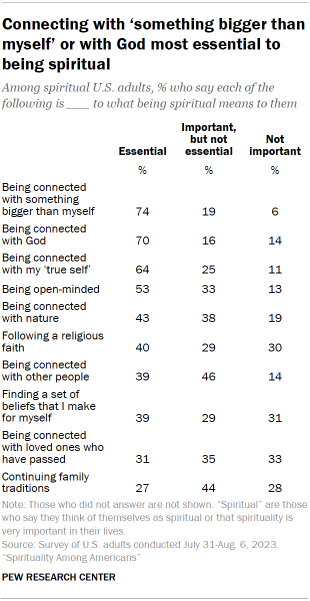
To further gauge how Americans think about spirituality, the survey asked those who are spiritual whether each of 10 items is “essential,” “important but not essential,” or “not important” to what being spiritual means to them.
Most spiritual Americans say “being connected with something bigger than myself” (74%) is essential to what being spiritual means to them, along with “being connected with God” (70%) and “being connected with my true self” (64%).
Many also say “being open-minded” (53%), “being connected with nature” (43%), “following a religious faith” (40%), “being connected with other people” (39%) or “finding a set of beliefs that I make for myself” (39%) are essential to being spiritual.
Fewer spiritual Americans say “being connected with loved ones who have passed” (31%) or “continuing family traditions” (27%) are essential to what being spiritual means to them.
What do people in different religious groups think is essential to being spiritual?
Evangelical Protestants and members of the historically Black Protestant tradition who describe themselves as spiritual (either by saying that they think of themselves as spiritual or that spirituality is very important in their lives) stand out for a tendency to say that “being connected with God” is essential to what being spiritual means to them. Fully 92% of evangelicals and 89% of members of historically Black Protestant churches who are spiritual take this position. They are also the most likely of the large religious groups analyzed to say that “following a religious faith” is essential.
Compared with spiritual adults who are affiliated with a religion, unaffiliated spiritual adults are more likely to say that “being open-minded” (70%) and “being connected with nature” (63%) are essential to what being spiritual means to them.
Across the board, spiritual Americans in most of the demographic groups included in this analysis say that “being connected with something bigger than myself” is essential to what being spiritual means to them.
The survey also asked spiritual adults whether there is anything else (other than the 10 listed items) they consider essential to what spirituality means to them. Respondents could answer this open-ended question however they wished. Among the more common answers were being kind or respectful (9%); believing in Jesus, the Holy Spirit or other elements of Christian theology (5%); and following religious teachings or scripture (4%).
(For more details, go to the Topline.)
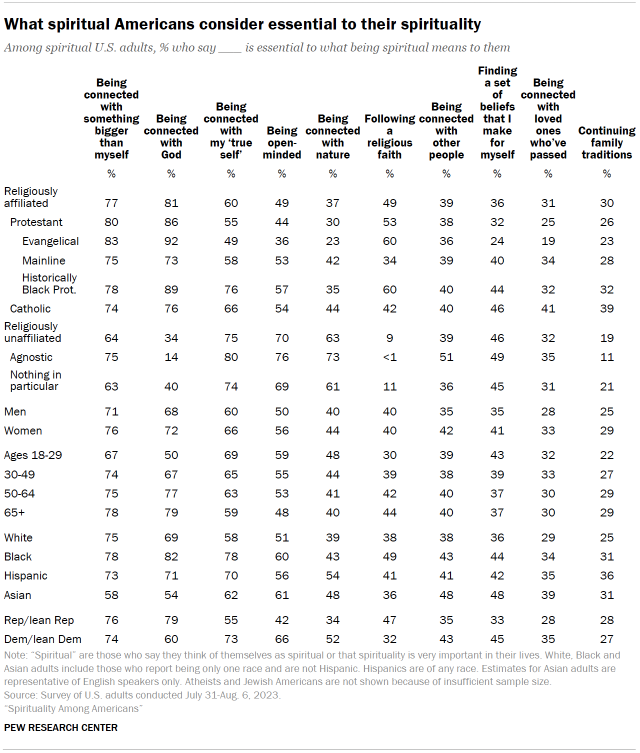
What does ‘spiritual’ mean?
In addition to asking spiritual respondents what they view as essential to being spiritual, we also asked all surveyed respondents to describe, in their own words, what the term “spiritual” means to them. We categorized their responses based on the types of beliefs, experiences or other concepts they mentioned.
Fully 27% give descriptions tied to organized religion. For example, they cite belief in God (12%), or belief in Jesus, the Holy Spirit or other elements of Christian theology (8%). On the other hand, 4% say explicitly that spirituality is separate from or outside of organized religion – including opposition to, or nonparticipation in, organized religion (1%).
About one-third of respondents (32%) offer responses that mention beliefs in what we categorized as “something else,” such as belief in a higher power (14%) or belief in the unseen or otherworldly (7%).
About one-quarter of Americans, when asked to describe the term “spiritual” in their own words, mention connections (24%), such as with God (12%), nature (4%) or with themselves (4%).
One-in-ten Americans say the term relates to understanding themselves or guiding their own behavior, including efforts to be kind or respectful (4%), finding inner peace (2%), purpose and meaning (2%) or a sense of guidance and direction (2%).
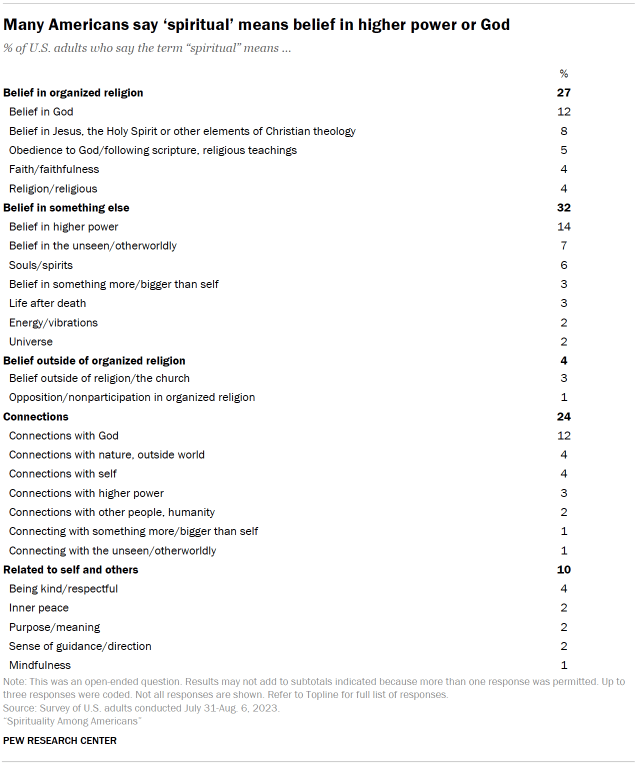
In their own words, how some respondents described what ‘spiritual’ means to them
Here are a few of the thousands of answers we got to this open-ended question, lightly edited for spelling and grammar:
“Being one with your soul, emotions, feelings, actions.”
“It means having a relationship with God and a belief system that includes a responsibility to do what is right.”
“Connecting with the creator who is the source of my existence. Providing strength, guidance, hope and peace. The word of God provides direction for my life.”
“I believe that God is, in part, a spirit, and that each of us (humans) has a spirit. God is the Holy Spirit, and I have given my life – all of it (spirit, mind, body) – to Him. To live spiritually is walking in the knowledge and conviction of that previous statement and personally living in accordance with the Bible in how it instructs.”
“Not adhering to any particular religion, but acknowledging higher powers that exist above all that is.”
“Believing in something larger and more creative than science.”
“I believe there is a God who is a higher power to all that exists. I don’t have to attend a church to feel that God is everywhere and in the beauty of everything.”
“I believe that there is a force bigger than me just not necessarily a god or deity.”
“Spiritual means to discover your own self by deep meditation and contemplation. Love everyone, hate none.”
“That [I] respect the Earth and life of the planet. Live intentionally as possible, with care.”
“One with the universe!”
“I associate spiritual with religious. Something that takes me outside of my everyday life. Both a chance to have moments of reflection and solace and continue generational customs and practices.”
“[B]eing spiritual means to tune in with your inner self and your soul and reflect on what you believe controls things. To think about and believe whatever you feel exists that’s bigger than us and whether or not it has a grand plan for us and our world.”
“The belief that a supreme being is the creator and ultimate controller of the universe, and that humans’ existence in this realm is transient.”
“To me, spiritual means to be in touch with nature, see the beauty in everything, feel the love of Mother Nature, to know that there is something out there that is greater than me, that loves me, that looks out for me. I find that mostly in nature – the sun, the moon, trees, flowers, wild bunnies running through my yard, the deer standing stoically as if posing for me to enjoy their beauty. In addition, I try to follow the teaching of Jesus, because he had some pretty good advice.”




